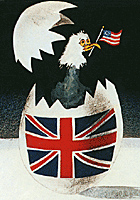 This week as I've kept abreast of the Churchill affair, continued my explorations of the politically-charged blogosphere, and viewed some of the cable news talk shows, I have also watched, repeatedly and as a form of therapy, the amiable musical 1776. I remember buying a paperback copy of the screenplay when I was 13. I loved it. Two years later I worked stage crew on a community theater production of 1776. I loved it all over again.
This week as I've kept abreast of the Churchill affair, continued my explorations of the politically-charged blogosphere, and viewed some of the cable news talk shows, I have also watched, repeatedly and as a form of therapy, the amiable musical 1776. I remember buying a paperback copy of the screenplay when I was 13. I loved it. Two years later I worked stage crew on a community theater production of 1776. I loved it all over again.It's just fun. How many times do you get to see the Founding Fathers sing, dance, and crack jokes?
But it's also nostalgic, a reminder to me of what I once thought political life was like: informed, engaged, civil, and serious-minded in a way I rarely see these days. Or come to think of it, ever.
Informed? Most political conversation consists of sound bites and talking points--even in real life when time is not at a premium.
Engaged? People mostly talk and listen to those with whom they already agree.
Civil? When we do talk across party and ideological lines we think it's okay, even laudable, to have a discourse consisting largely of name-calling , slanders, half-truths, double standards, and mutual censorship (shut up! no, you shut up!).
Serious-minded? How many people who whoop it up about politics actually know anything about it? Useful political dialogue isn't just about opinions. There has to be a modicum of factual basis for discussions about policy, a reservoir of factual data on which people can agree. But we seem uninterested in finding a common data set from which an informed exchange of views can proceed.
It would be nice, of course, to believe this is something new and awful in American political life, that we can and should go back to "the good old days."
But let's face it, the old days never existed. I'm a Civil War historian, which means I am a chronicler of the greatest disaster this country's political culture ever produced. And even if I were a historian of some other place and period, things would not be that much better. Even the Founders existed in world characterized less by wigs and perfumed words than by the odor of burning homes and spent gunpowder.
Still, it is permissible to hope for better. It is permissible to insist on civil exchange and to cry foul when people resort to the usual crass tricks of politics as usual. I had to make up my mind about this recently when a former colleague decided to lob a few email grenades at a campus effort to remember the internment of Japanese Americans during World War II.
Continue to next page

No comments:
Post a Comment